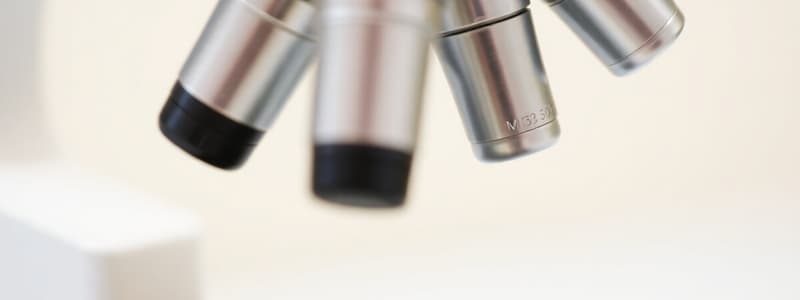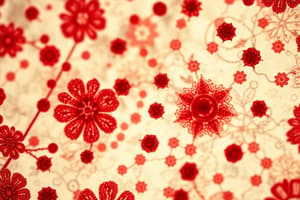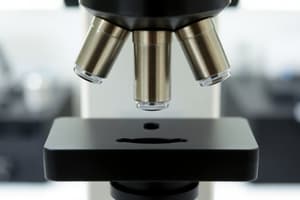Podcast
Questions and Answers
What is the primary function of magnification in a microscope?
What is the primary function of magnification in a microscope?
- To enhance color details
- To stabilize the image
- To brighten the image
- To enlarge the image (correct)
What is resolution in the context of microscopy?
What is resolution in the context of microscopy?
- The color depth of the image
- The brightness of the image
- The ability to separate two points (correct)
- The overall size of the image
What type of microscope is capable of achieving magnifications up to 1,000,000x?
What type of microscope is capable of achieving magnifications up to 1,000,000x?
- Electron Microscope (correct)
- Light Microscope
- Dissecting Microscope
- Glass Microscope
Which step is NOT part of the proper usage of a microscope?
Which step is NOT part of the proper usage of a microscope?
As magnification increases, what happens to resolution?
As magnification increases, what happens to resolution?
What are the three main types of microscopes mentioned?
What are the three main types of microscopes mentioned?
Flashcards
Resolution
Resolution
The ability to see details. It measures how well you can distinguish two points as separate.
Microscope
Microscope
A device that uses lenses to magnify small objects.
Magnification
Magnification
The ability to enlarge the size of an image.
Light Microscope
Light Microscope
Signup and view all the flashcards
Electron Microscopes
Electron Microscopes
Signup and view all the flashcards
Dissecting Microscope
Dissecting Microscope
Signup and view all the flashcards
Study Notes
Microscope Fundamentals
- Microscopes are devices using magnifying lenses to view small objects in detail, producing enlarged images.
- Two key functions:
- Magnification: Increasing the apparent size of an image. Higher magnification means zooming in on the specimen.
- Resolution: The ability to distinguish two separate points as distinct. Greater resolution means seeing finer details. Increased magnification usually means improved resolution.
Magnification and Resolution
- Resolution is the ability to see details, meaning the ability to determine two points as separate.
- As magnification increases, resolution typically also increases.
Types of Microscopes
- Light Microscopes: Use visible light.
- Electron Microscopes: Use beams of electrons, offering much higher magnification and resolution than light microscopes. Can see details within a cell that light microscopes miss.
- Dissecting Microscopes: Useful for viewing larger specimens or structures.
Parts of a Light Microscope
- Eyepiece (Ocular Lens): The lens you look through.
- Body Tube: Connects the eyepiece to the objective lens.
- Revolving Nosepiece: Holds the objective lenses.
- Objective Lenses: Lenses that magnify the specimen.
- Stage: Platform to hold the slide.
- Stage Clips: Secure the slide on the stage.
- Diaphragm: Controls the amount of light passing through the specimen.
- Light Source: Illuminates the specimen.
- Coarse Focus Adjustment Knob: Used for initial focusing.
- Fine Focus Adjustment Knob: Makes precise adjustments for clearer images.
- Arm: Supports the microscope body and is used for carrying.
- Base: The bottom of the microscope.
- Condenser Lens: Focuses the light source onto the specimen.
Using a Microscope
- Place the slide on the stage and secure with stage clips.
- Rotate the nosepiece to the lowest-power objective lens (shortest one).
- Look through the eyepiece and use the coarse focus knob to bring the specimen into approximate focus.
- Fine focus adjustments are needed for crisp images.
Studying That Suits You
Use AI to generate personalized quizzes and flashcards to suit your learning preferences.




